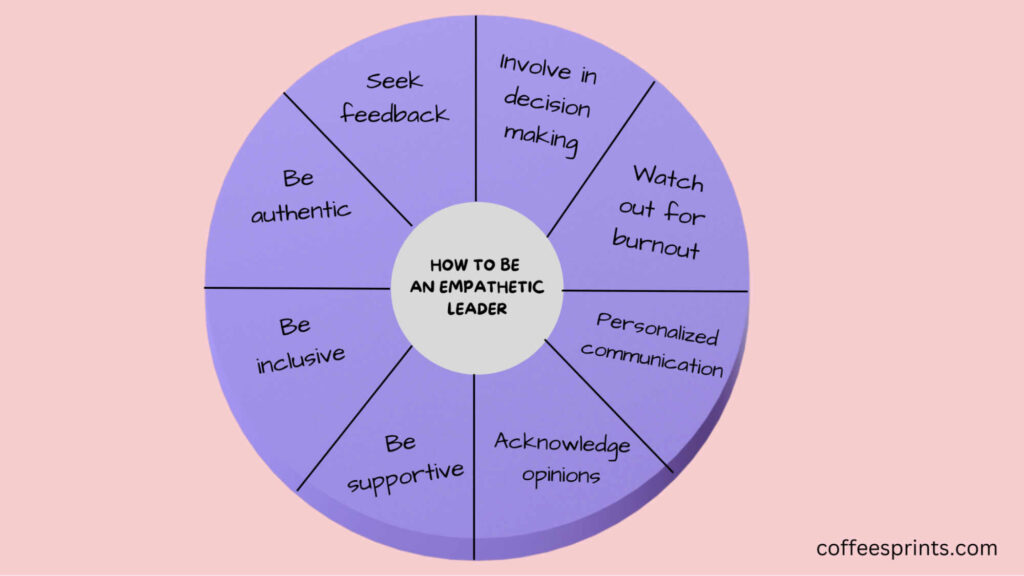The business world is changing.
Companies need more than just an authoritative figure to lead the teams.
In the changing times, you need to balance hard and soft skills to be a great leader or manager.
So, what’s the one skill that could change your team dynamics and productivity?
Empathy!
It’s not just a trait. Empathy is a skill that leaders should nurture to help them connect and inspire their teams.
In this article, let’s understand what empathy in leadership looks like, some examples of empathetic leaders, and how to become one.
Here’s a quick peek into the topic:
- What does empathy in leadership mean?
- Why is empathy important to a leader?
- Some examples of empathetic leaders
- Is empathy a trait or a skill?
- How does empathy benefit you?
- How to become an empathetic leader at work
- What happens when the employees don’t show empathy in the workplace
What does empathy in leadership mean?
As an empathetic leader, you are attuned to others’ emotions, needs, and concerns. You, as a leader, understand and share the feelings, thoughts, and perspectives of your team members or colleagues. This way, you create a positive and supportive work environment where your team members feel valued, respected, and motivated.
Empathy also enables you to foster self-motivation, collaboration, and diversity in your organization.
Let’s understand this with an example.
Imagine one of your team members is going through a personal crisis, like a family illness or a loss.
You can respond to this situation in two ways. You can acknowledge their emotions, offer support, and show understanding. You can give them a flexible work schedule and listen to their concerns.
Alternatively, you can dismiss their distress or worries and ask them to stick to the company’s policies. You may not consider their emotional state in this case. The employee still would stick to the rules but may end up feeling isolated and unappreciated.
In the first scenario, you responded to the employee with Empathy. Your compassionate response can help them feel valued and supported during a difficult time, ultimately strengthening their loyalty and productivity.

In the second case, being insensitive can hamper the employee’s morale, productivity, and overall team dynamics.
Note: Ensure your team doesn’t exploit your empathy, resulting in a different problem altogether.
Why is empathy important to a leader?
The above-mentioned example suffices to showcase the importance of empathy in leadership. However, here are some professional benefits of empathy in leadership:
- You can build trust and loyalty with your team members, who will appreciate your genuine interest and care for them.
- You can improve your communication and feedback skills, as you can listen actively, ask open-ended questions, and express appreciation and recognition.
- You can enhance your problem-solving and decision-making abilities, as you can consider multiple perspectives, understand the root causes of issues, and find win-win solutions.
- You can increase your emotional intelligence and self-awareness, as you can regulate your own emotions, empathize with yourself, and learn from your mistakes. A leader who is self-aware can achieve wonders for himself and the team.
- You can inspire and empower your team members, who will feel more engaged, productive, and creative in their work.
Some examples of empathetic leaders
Let me give you some examples of empathetic leaders:
Patricia Moore, a designer who disguised herself as an elderly woman for three years to experience the challenges of aging. She used this empathy to create more accessible and user-friendly products for older people.
Brené Brown is a researcher and author who studied the power of vulnerability, courage, and empathy. She has inspired millions of people to embrace their imperfections and connect with others authentically.
Dalai Lama, the spiritual leader of Tibetan Buddhism, advocates for compassion, kindness, and peace. He has shown empathy for people of different faiths, cultures, and backgrounds and has received the Nobel Peace Prize for his efforts.
These are just a few examples of empathetic leaders who created better outcomes by understanding and sharing the feelings of others.
Is empathy a trait or a skill?
I’ve heard people saying, “I lack empathy” or “I can’t show empathy.” Most of us are under the impression that empathy is a trait that you either have or don’t have.
Well, that’s not true. Empathy is not a fixed trait. Just like any other people’s management skill, empathy is a skill that anyone can develop and practice over time.
Here are some ways you can cultivate empathy at your workplace:
- Be curious and open-minded about others, and try to learn from their experiences, backgrounds, and cultures.
- Be attentive and present when interacting with others, and avoid distractions, interruptions, or judgments.
- Show your team that you care about their well-being, feelings, and opinions.
- Value your team’s ideas, thoughts, feelings, contributions, and feedback.
- Be humble and authentic in your leadership, and admit your limitations, vulnerabilities, and failures.
Empathy is an important leadership skill for our changing times. Lead with empathy, and you can make a positive difference in your team and your organization.
How does empathy benefit you?
Empathy in the workplace can have several positive outcomes, benefiting both employees and the organization as a whole.
Here are some things you can achieve by demonstrating empathy in the workplace:
1. Boost Employee Morale
You can create a more positive and supportive work environment, which boosts employee morale by being an empathetic leader. When employees feel valued and understood, they are more likely to be engaged, satisfied, and motivated in their roles. Plus, they’d be proactive in taking up tasks.
2. Improved Retention
Employees are more likely to stay with an organization where their emotional well-being is acknowledged and where they feel their needs are considered. It can reduce turnover and the associated costs of hiring and training new staff.
3. Increased Productivity
Empathy fosters better communication and collaboration among team members. When people feel heard and understood, they are more likely to work together effectively and resolve conflicts constructively, leading to improved productivity and teamwork.
4. Better Conflict Resolution
Conflicts are a common part of the workplace that you can’t avoid. Empathetic leaders are sensible. They can defuse conflicts more effectively by understanding the root causes without hassle. This can prevent small issues from escalating into larger problems that disrupt the work environment.
5. Enhanced Innovation and Personal Growth
Empathy encourages a culture where diverse perspectives and ideas are valued. This promotes trust and transparency among teams. When employees feel comfortable sharing their thoughts and ideas, it can lead to a more innovative and creative work environment and foster employee growth.
Besides, empathy helps you provide constructive feedback and opportunities for development. This enables your team to reach their full potential.
6. Enhanced Customer Relations
Customer service is an essential part of any business. The way your employees interact with your customers can make or break your customer relations.
A more empathetic workforce is better equipped to understand and meet the needs of customers, resulting in improved customer satisfaction and loyalty. It also reduces your Customer Acquisition Costs (CAC).
7. Positive Organizational Reputation
Customers rarely remember your products. They remember your stories and the experiences you create. So, ensure you create a strong culture of empathy. Organizations with empathetic leaders are likely to be seen as socially responsible and ethical. This can enhance your company’s reputation and attractiveness to customers, partners, and stakeholders.
How to become an empathetic leader at work
Empathy can help you improve communication, strengthen working relationships, boost creative thinking, and enhance customer service in the workplace.

Some of the ways to develop empathy in leadership are:
Involve your team in decision-making
This builds trust, a necessary component of empathy. Seek your team’s opinion before making major changes, and consider how actions can affect your employees’ lives.
Watch out for signs of burnout
You don’t have to look for burnout signs openly. But it is a serious problem at workplaces, which could affect your team members. When you recognize burnout among your team members, offer them support, flexibility, and incentives.
Personalize your communication
Adapt your tone, body language, and style to the person or group you interact with. Use their names, ask about their interests, and show genuine interest.
Acknowledge and appreciate perspectives
There will be different opinions in a team. Even if you disagree with someone, try to understand their point of view and respect their opinions and feedback. Do not judge, criticize, or argue, and do not let other employees do the same.
Be compassionate and supportive
Show your colleagues that you care about their well-being, feelings, and opinions. Phrases like “I’m sorry,” “How are you doing today?” or “Thank you” can go a long way.
Be respectful and inclusive
Value the diversity and contributions of your colleagues, and treat them with dignity and fairness. Do not encourage biases, stereotypes, and discrimination.
Be authentic
Leaders who show their vulnerable side are often relatable to their employees. It is okay to accept your limitations, vulnerabilities, and failures and learn from them. Don’t pretend to know everything or act superior to others.
Seek feedback
A good leader always wants to learn. Feedback is a way to learn from your mistakes and successes and to improve your empathy skills. Ask for feedback from your colleagues, and give feedback to others in a constructive and empathetic way.

What happens when the employees don’t show empathy in the workplace
Empathy is not only important to the leader but also to the employees. A company that isn’t empathetic can face many negative consequences, such as:
Poor quality in employees’ well-being:
Employees who do not feel valued, respected, or cared for by their leaders or colleagues may experience low morale, stress, burnout, dissatisfaction, and disengagement.
Selfishness within the organization:
We observe this trait in many toxic work environments. If employees do not feel safe and taken care of by their leaders and colleagues, they may adopt a survival mentality and focus on their own interests rather than the team or the company’s goals.
Low performance and productivity:
Employees who do not feel motivated, engaged, or supported by their leaders or colleagues may not perform at their best or may even sabotage the work of others.
High turnover and related costs:
Employees who do not feel loyal, committed, or happy with their leaders or colleagues may leave the company or may be fired for poor performance or behavior. This can result in increased costs for recruitment, training, and retention.
Failure to achieve company goals:
Employees who do not collaborate, cooperate, or communicate effectively with their leaders or colleagues may not be able to achieve the company’s vision, mission, or objectives.
Damage to company reputation:
Employees who do not act ethically, professionally, or respectfully with their leaders, colleagues, customers, or stakeholders may damage the company’s reputation and brand image.
As a leader, your empathy is your valuable asset. Demonstrate empathy to create a better work environment. This way, you contribute to many benefits ranging from improved employee well-being and satisfaction to increased productivity and a stronger organizational reputation.
